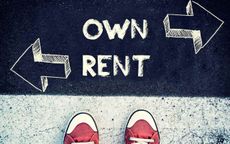How I Bought My First Home
Millennials came of age as the housing bubble burst and lenders put credit in a vise. Now we make up the largest group of home buyers.


After more than five years in the Washington, D.C., area, three apartments and eight roommates, I became a homeowner last summer. Sharing the rent with others had kept housing costs affordable, and I made several good friends along the way. But ultimately I craved the stability that would come from saying farewell to rent-hiking landlords, slapdash maintenance and the roommate revolving door. And I was excited to experience the benefits as well as the responsibilities of homeownership.
For a long time, millennials weren’t buying homes at the same rate as previous generations–largely because we came of age as the housing bubble burst and lenders put credit in a vise.
But if you’re unsure where a job, relationship or life may take you in the next few years, renting likely beats buying. You’ll also want to check out the buy-to-rent ratio in your area–that is, the median sale price of a home divided by the average annual rent for a similar one. In general, if the ratio is less than 15, the market favors buyers; more than 20 and it rewards renters. Ratios in-between can go either way, depending on taxes and the rate of appreciation. To assess your situation, use an online calculator, such as Trulia’s Rent vs. Buy Calculator.

Sign up for Kiplinger’s Free E-Newsletters
Profit and prosper with the best of expert advice on investing, taxes, retirement, personal finance and more - straight to your e-mail.
Profit and prosper with the best of expert advice - straight to your e-mail.
The mortgage grind. To qualify for a mortgage, your monthly housing expenses–including principal and interest, real estate taxes, homeowners insurance, and homeowners or condo association dues–usually can’t exceed 28% of your gross monthly income. For many millennials, that isn’t the biggest challenge; it’s coming up with the cash at the beginning. You can probably get a mortgage with a down payment of just 3% to 3.5% of the purchase price, but you’ll need an extra 2% to 4% of the purchase price to cover the appraisal, taxes and other costs you’ll have to pay to close the deal. If you put down less than 20%, you’ll need private mortgage insurance, which usually costs 0.5% to 1.5% of the loan amount each year.
I had been toying with the idea of buying for years, and I funneled as much cash as I could (from a raise and the extra money I had after paying off my student loans and moving to a cheaper apartment) into a savings account. To cover a shortfall, you may be able to borrow from your 401(k) or tap your IRA. Before I found my one-bedroom condo (two blocks from Metro!), I made sure I was preapproved for a mortgage. I have a strong credit history, so qualifying for the mortgage went smoothly. But lenders did put my finances under a microscope. I had to explain everything that was a little outside the norm, from a PayPal transfer to a reimbursement check from a work trip.
Help from Mom and Dad. Parents are often willing to extend a helping hand. The simplest strategy is for them to give you money to put toward your down payment or closing costs. Your lender will require a letter stating that the money is a gift, not a loan, since a loan from your parents increases your total debt, making it harder to get a mortgage. Alternatively, if your parents are comfortable putting their credit on the line, they can jointly apply for a mortgage as a “non-occupant co-borrower,” which means they have an interest in the property and can add cash of their own to the mix. My parents and I preferred the second option, but we had several conversations to outline a repayment plan and other specifics to make sure everyone was comfortable with the arrangement.
So far, homeownership is great. The biggest change? The amount of time–and money–I spend at the hardware store.

-
 Stock Market Today: S&P 500, Nasdaq Extend Losing Streaks
Stock Market Today: S&P 500, Nasdaq Extend Losing StreaksThe two indexes have closed lower for five straight sessions.
By Karee Venema Published
-
 Save Over $40 on Audible With Amazon's Latest Deal
Save Over $40 on Audible With Amazon's Latest DealAmazon’s latest promotion lets you score three months of Audible for just $0.99 a month.
By Erin Bendig Published
-
 When Renting Is Smarter Than Buying
When Renting Is Smarter Than Buyingreal estate There are some situations when renting is smarter than buying. You're not necessarily throwing your money away when you rent.
By Miriam Cross Published
-
 Rent vs. Buy: Sometimes Renting is Better
Rent vs. Buy: Sometimes Renting is BetterPersonal finance experts have long held that homeownership is a key step to building lasting wealth. How does that hold up in a pricey real estate market?
By Rivan V. Stinson Published
-
 Keep Moving Costs in Check
Keep Moving Costs in CheckMaking Your Money Last If I've learned anything, it's that moving is almost always more costly and time-consuming than I anticipate.
By Lisa Gerstner Published
-
 How to Negotiate a Break on Rent
How to Negotiate a Break on RentHealthy Living on a Budget The downward trend in rents has me thinking it's time to ask my apartment manager to reduce my rent.
By Rivan V. Stinson Published